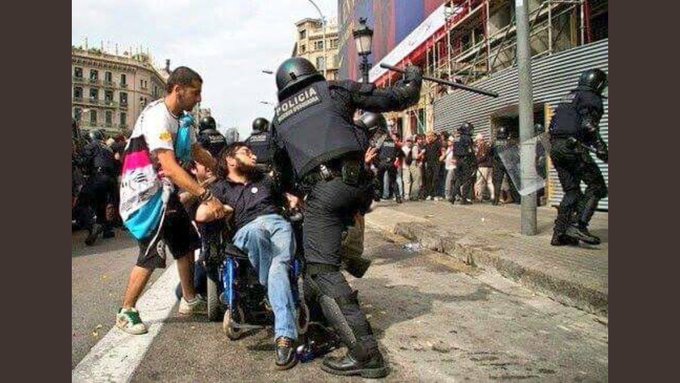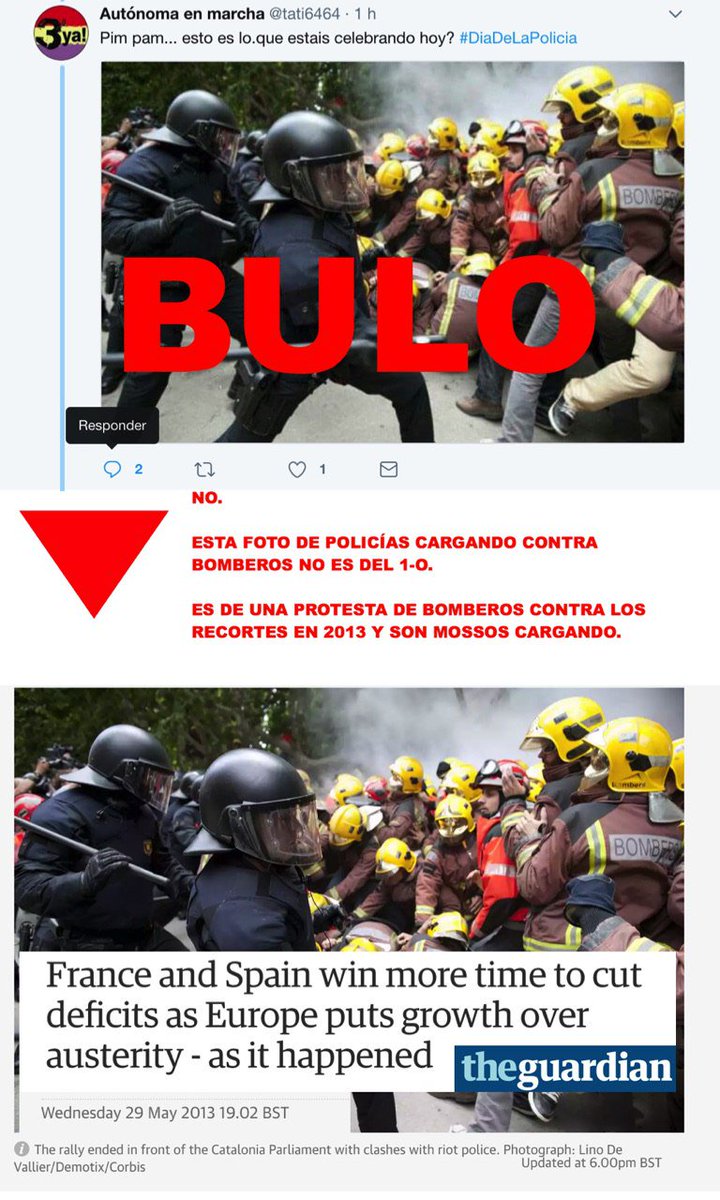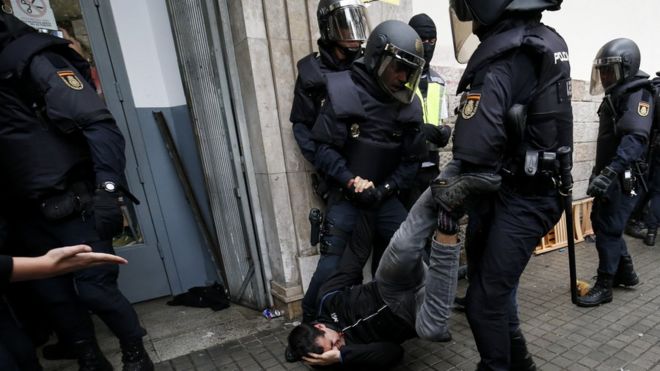
Spain has announced it is preparing to suspend Catalonia's regional autonomy, after the Catalan leader Carles Puigdemont threatened to declare independence. Even before this move, separatists had condemned the actions of the Spanish government and police during an outlawed independence referendum on 1 October.
Some called those actions repressive - a sentiment expressed most clearly in a video produced by the Catalan cultural organisation Omnium Cultural. It's been viewed more than a million times.
One of the most striking claims in the video was that police subjected Catalan voters to "a degree of force never seen before in a European member state".
After Spain's constitutional court declared the poll illegal, police officers were authorised to stop it going ahead. They prevented some people from voting, and seized ballot papers and boxes at polling stations.
Speaking to the BBC on Sunday, Spain's foreign minister Alfonso Dastis, claimed images of police violence were "fake".
Who is correct?
Fake photos
It is true that fake photos have been used but virtually all of the media coverage showing police violence was real - including all of that shown by the BBC.
Photos which are six years old have been shared online purporting to show violence in Catalonia on 1 October.
Read More:
For example, this photo was shared in a manner that suggested a disabled Catalan voter was being hit with a baton.
In fact, the photo was shared by bloggers in 2011, when police clashed with anti-austerity protesters in Barcelona.
Various examples have been collected by Spanish fact-checkers Maldito Bulo ("damned hoax") - such as this use of a photo from a firefighters' protest in 2013 to suggest that firefighters were squaring up to police officers on October 1.
Police brutality?
Just because some of the photos were fakes doesn't mean that all or even many of them were.
Reality Check has spoken to journalists who witnessed police shoving people, grabbing them by the hair and throwing them down stairs. And photojournalists saw police firing rubber bullets,
Indeed, the Spanish Government accepts there was some violence - and has apologised for it.
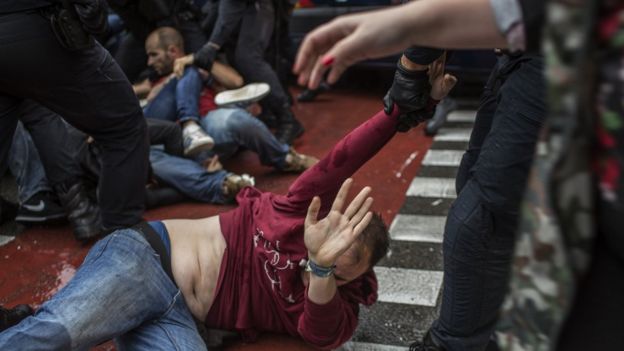 |
| When protesters tried to stop police officers removing ballot boxes, they were dragged out of the way |
The worst in Europe?
So there was police violence on 1 October. Was it the worst ever seen in an EU member state?
Some of the early reports of injuries were exaggerated. One woman had claimed that police had intentionally broken her fingers. In reality, her fingers weren't broken, just inflamed - as she explained to the Catalan state broadcaster TV3 after she'd received treatment.
On 20 October, the Catalan department of health released revised figures of the number of people who had sought medical treatment because of police action on polling day. These figures were gathered by the various hospitals, clinics and paramedics who treated them.
They say 1,066 people sought medical treatment, 991 on the day and 75 in the days that followed.
Most people - 886 - were classed as having only a minor injury or condition. Five were considered to be seriously injured.
These figures are from the Department of Health, which is a branch of the Catalan government. We have no way of independently verifying whether all 1,066 injuries were caused by police officers. This is the only data available, and has been used in arguments by both sides of the independence debate.
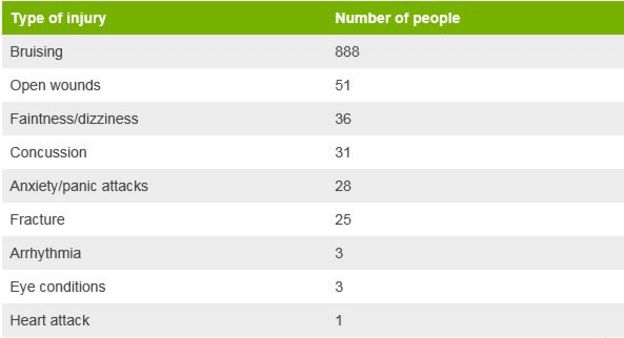 |
| SOURCE: Catalan Department of Health |
Earlier totals had been disputed by Spanish ministers and newspapers - arguing that people might turn up at a clinic despite having no medical complaint.
However, the Catalan health service insists everyone included in these latest figures received a diagnosis from a medical professional.
Twelve police officers were also injured on polling day. This figure is agreed by both the Catalan department of health and the Spanish government.
It is difficult to find examples where as many civilians were injured during clashes with police. Yet when assessing the level of violence, the degree of force is important, not just the number of injuries.
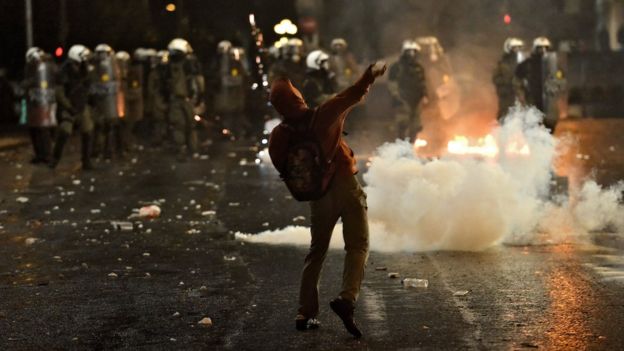 |
| Police used tear gas to disperse anti-austerity protesters in Athens in 2012. |
There are various cases where police in EU member states used an equivalent or even higher degree of force in public.
Here are some recent examples:
- A man died last year when police in Belfast used CS spray during a violent incident in the city centre
- German police in Hamburg used water cannon to disperse protesters at this summer's G20 summit. 270 were treated for injuries - and 20 of those were treated as inpatients.
- Dozens of protesters were injured in Athens when police used tear gas after anti-austerity protests turned violent in 2012.
- Portuguese police beat a man in front of his young children outside a football stadium in 2015.
- Two hundred were injured in Genoa, Italy after police beat protesters at the G8 summit in 2002.
It is worth noting that none of those events were votes.
Source: BBCNews

